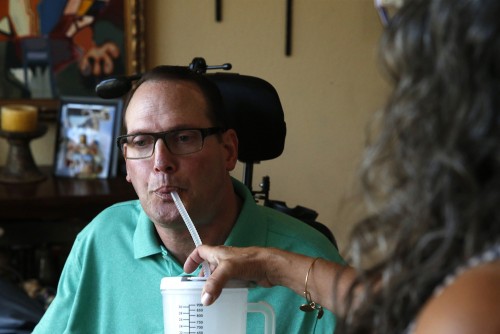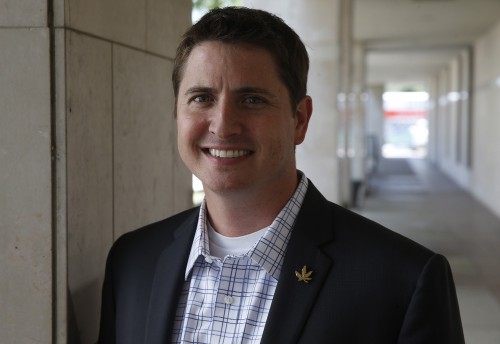One marijuana business hosts an annual golf tournament in Denver to raise money for multiple sclerosis research. Another Colorado pot company donates to a gay-rights advocacy group and is a sponsor of an AIDS walk.
As marijuana legalization matures, businesses are becoming more ingrained in their communities by donating cash and time to charities — a sign that the stigma of selling a drug that remains illegal under federal law may be fading.

“It’s not all about making money and about profiting,” said Ean Seeb, co-owner of Denver Relief, a dispensary whose monetary and volunteering donations include Ekar Farm and Garden, which grows vegetables for food banks.
It’s unknown how much money marijuana businesses have donated to nonprofits nationally and in Colorado.
“It is a brand new public conversation,” said Tom Downey, a regulatory attorney who specializes in marijuana.
He is a director at the firm Ireland Stapleton, which hosted a meeting in July at the state Capitol regarding donations with about 150 people from charitable organizations, lawyers and pot companies.
The Department of Justice, which has been watching the growing legal pot industries, declined to comment. The IRS declined to comment, except to say that marijuana businesses can’t write off donations on tax filings.
Stigmas and social issues
Parenting: How parents in marijuana industry talk to their own kids about pot
Cannabis consumers: Is Colorado’s outdoorsy image breaking ‘stoner’ stereotypes?
The new frontier: Colorado cannabis experiment puts state in global spotlight
Shop Sesh interview: Busy Bianca Barnhill — activist, High Times correspondent, businesswoman
NEW: Get podcasts of The Cannabist Show.
Subscribe to our newsletter here.
Watch The Cannabist Show.
Colorado residents, for example, gave $3.4 billion to charities in 2012, the most recent data available from the IRS, according to the Colorado Association of Funders, a group that represents foundations.
Colorado foundations themselves donated about $800 million to charities in 2013.
The state has nearly 30,000 nonprofits, some of them tiny organizations, all competing for funds, said Joanne Kelley, executive director of the Colorado Association of Funders.
Enter the highly profitable legal marijuana industry, which was worth $2.7 billion in 2014, according to industry investment and research firm The ArcView Group.
But the industry’s profitability, and the charities’ need for contributions, is only one reason nonprofits and pot businesses have developed relationships.
Many in the marijuana industry have been big believers of the drug’s medical value and that has carried over to philanthropy, while the charities themselves sometimes serve populations that use the drug for ailments.
Matt Huron, founder and CEO of Good Chemistry in Colorado, traces his company’s philanthropy to his time managing a marijuana cooperative that grew pot for people who used it medically in San Francisco.
His father and his partner, who were both HIV positive, used the drug medically. His father died in 2009.

Huron said when it came to giving, he wanted “to keep that spirit alive” when he started his business in Colorado. But he found that some nonprofits were unwilling to accept donations from his company.
While reluctance is fading, he said, a stigma remains.
“We’re still breaking federal law,” he added.
Huron’s company donates to One Colorado, a gay rights advocacy group, but he declined to say how much.
Dave Montez, executive director of One Colorado, said his organization’s standard for accepting donations comes down to whether the contributor is accepting of the gay community.
“Good Chemistry exemplifies a local business who is committed to improving the lives of lesbian, gay, bisexual, and transgender Coloradans by treating their employees fairly as well as giving back to the community,” he said in a statement.
Dank donations
NEW: Get podcasts of The Cannabist Show.
Subscribe to our newsletter here.
Watch The Cannabist Show.
Another marijuana business, The Clinic, hosts an annual golf tournament to raise money for the Colorado and Wyoming chapters of the National Multiple Sclerosis Society.
The Clinic’s general manager, Ryan Cook, said employees also participate in an annual MS walk to raise money and have contributed nearly $291,000 since 2009 from that event and the golf tournament.
Kaylin Daniels, donor relations officer at the National Multiple Sclerosis Society, noted that medical marijuana use is acceptable among its constituency. And she said states’ approval of medical and particularly recreational pot in Colorado has helped develop a connection with The Clinic.
Just last year, Daniels said, The Clinic “became the top corporate team for Walk MS for Colorado and Wyoming.”
Still, some nonprofits are wary of marijuana donations. The Children’s Hospital Colorado Foundation has a policy of not accepting such donations, said spokeswoman Elizabeth Whitehead, because the drug is still illegal federally.
Connie Zimmerman, founder of Colorado Homeless Families, which helps with transitional housing, has not been offered help from marijuana businesses but said she wouldn’t accept it because she considers the drug detrimental to her clients.
“We don’t feel right about accepting donations from the profits and proceeds of the marijuana business that can devalue or diminish the quality of the family and lifestyle relationships of individuals,” Zimmerman said.
